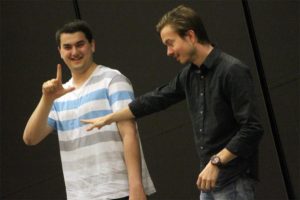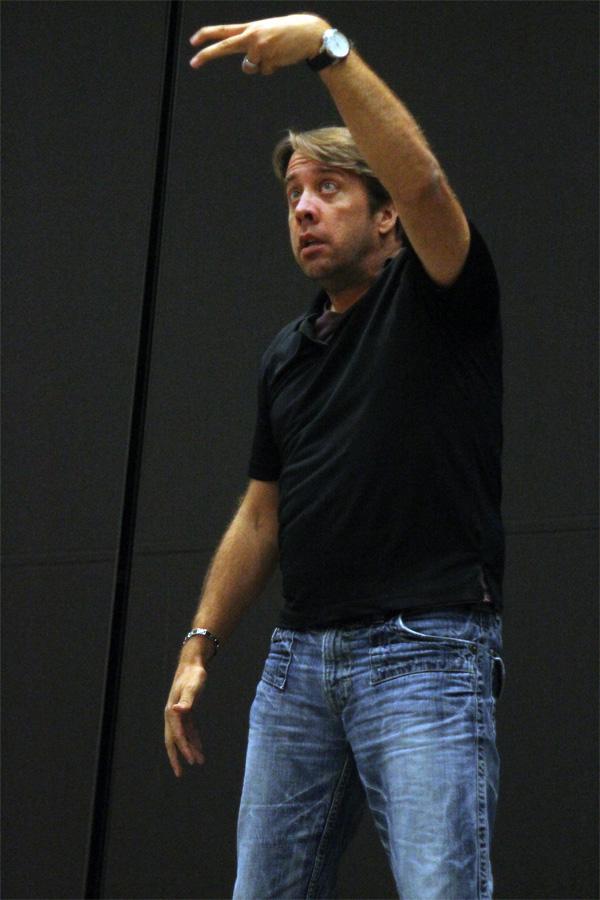During the course of his childhood in the 70s, his face was glued to his television set studying the art of comedy from Richard Pryor, Steve Martin, Bob Newhart and countless others.
From watching the comedy greats, soon Keith Wann began performing stand-up routines on his own.
Though Wann admit he needed to watch his comedy heroes ever so carefully, he explained. Wann grew up as a CODA, or child of a deaf adult. Both of Wann’s parents are deaf. He laughed to himself as he remembered the days before closed captioning when he was watching TV.
“I would be watching Richard Pryor on TV and my mom would stop to sign, ‘What is that man saying?’ as she would try to read his lips and I said, ‘Mom he’s saying mother, father deaf.’ (in place of an expletive) and she would say to me, ‘Oh! You should go clean your “mother father” room,” Wann said.
Keith Wann and comedy partner Windell “Wink” Smith Jr., also a CODA comedian, were welcomed to SRU Wednesday evening in the Smith Student Center Ballroom by SRU’s American Sign Language Club.
Wink heated up the stage as Wann voiced his partner’s signed ASL stand-up routine.
Wink explained to the audience that his father is ‘a militant ASL user’ and it would infuriate him to see people using SEE (Signed Exact English). ASL is a recognized language and prevalently used in the deaf community. It’s a large contributor to deaf identity, Wink explained.
He joked about taking a job as an interpreter for deaf videophones and hanging up on people until he was connected with his father. Once he was connected with his father he would purposefully speak in SEE to infuriate him. Wink and his father would frequently play pranks on each other.
Before his family purchased a videophone, Wink’s father would loudly wake him from his sleep clanging two pots together. Once Wink sprung from his bed his father would reply, “Oh good, you’re still hearing. I want you to call these people for me, but you might want to change your underwear first.”
In addition to his career as a CODA comedian, Wink is the CEO of his own company called Winkshop, Inc. He purchases ASL textbooks for universities and classrooms as well as performing, presenting, and interpreting in ASL.
“I’m a total introvert,” Wink confessed. “But when I hit the stage it’s the exact opposite. I become a complete extrovert.”
Wink said this is also the case in the deaf community. He is very socially involved while performing on stage and talking to deaf individuals. Otherwise he admits to being the guy to awkwardly stand in the corner, he said.
Wink is 26 years old and remembers meeting Wann while he was performing a drama about his deaf parents.

“The show was pretty serious but it had comedic parts,” he said. “Keith suggested that take bits of the comedy from my performance and turn it into stand-up.”
The two performed in Vegas four years ago, Wink said and have become comedic partners ever since. Wann and Keith also performed in a deaf improv show together called “Whose Sign Is It Anyway?”
His journey through comedy and ASL has led him to where he is now but Wann distinctly remembers his roots, he explained.
“I grew up in Oakland, California in the ‘70s,” he said. He is now 45 years old. “Before closed captioning I would interpret TV for my parents. Then the deaf community was a buzz when shows like Laverne and Shirley and Dynasty became closed captioned. Everyone was talking about that.”
Keith said he never minded signing for his parents. In fact, he enjoyed it.
Wann explained through his comedy that the deaf community is a very unique group of people. They are proud of who they are and do not see themselves as broken. They will drive with their legs while signing with passengers. With Wann and Wink’s families, practical jokes with their CODAs were always a good time, they also added.
When it came to advice for being a skilled ASL communicator Keith adamantly suggested, “Please do not learn Signed Exact English,” he exclaimed. “ASL is a very different language. It’s very conceptual. The best way to learn it is through interaction from a gaggle of deaf people.”








I don’t call it S.E.E. I call it H.P.S.L. Hearing People Sign Language
I don’t call it S.E.E. I call it H.P.S.L. Hearing People Sign Language